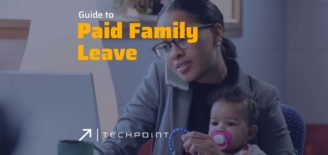Why parental leave policies are critical to attract talent
It’s 2019, and we are more connected than ever before. It’s common to do our work at coffee shops and our homes or send emails while waiting for our kids at the bus stop. Our constant connection, facilitated in large part by the tech industry’s products and practices, has opened the floodgates on a fast-paced, ever-growing cultural mentality that breeds burnout.
Now labeled as an “occupational phenomenon” with official recognition from the World Health Organization, burnout can intrude upon the life of any employee in a tech company, though none may be as susceptible as a parent of a newborn or young child. Research states that while working a full-time job in any industry, parents essentially take on another full-time job: moms spend an average of 32 hours per week caring for their children and home; dads average 20 hours.
That leaves a big question looming in my head: what benefits are offered to new parents working in Indiana tech companies, and what effect might those benefits have on attracting tech talent?
Nationally, only 25 percent of state and government workers had access to paid family leave in 2018. The numbers are worse for civilian workers at 17 percent and private industry workers at 16 percent, but even more worrisome is how those numbers skyrocket for unpaid leave. With one-in-four mothers raising children on their own, unpaid leave simply isn’t an option for most, which leads parents to go back to work faster, generating stress that they can’t just park in the car before they head into work.
However, tech companies are often known for providing culture perks and benefits that go above and beyond traditional, non-tech companies. Take a quick look at this list of top 10 tech companies with generous parental leave policies and benefits to get an idea of what they have made available.
Where does Indiana stand in offering such benefits? While the state has no official law requiring private companies to offer paid or unpaid parental leave, some large, well-known brands like Eli Lilly and Company and Salesforce, and even much smaller startup and scale-ups, have not only made tangible commitments but actively vocalize and market their benefits as not just a perk, but part of the culture.
Big co’s set highest standard for parental leave
Last fall, Lilly announced their revised parental leave policy that focuses on both new moms and dads as a traditional pair, and broadens the definition of parents to include families with two dads or two moms, or foster or adoptive parents. Starting January 1, 2019, new birth mothers can access a total of 18 weeks of paid time off and 10 additional weeks of unpaid leave, while mothers, fathers, and partners and adoptive and foster parents can take 10 weeks of paid leave plus 10 weeks of unpaid leave.
Salesforce, known widely for their inward and outward focus on equality and mindfulness, shows up to the parental leave discussion by offering up to 26 weeks of paid time off (or 6.5 months) to primary caregivers while secondary caregivers can take up to 12 weeks of paid time off. I know several friends and acquaintances who have taken advantage of this policy for their own families, which means it’s not just offered — it’s used.
“Lilly and Salesforce, among others, are great examples of tech-enabled companies seeing the need for inclusive parental leave policies that can attract experienced talent who are starting families or considering doing so soon,” says Merillat Flowers, Senior Director of College-to-Career Talent at TechPoint.
“We’ve heard from talent looking to move back home to Indiana who fit that demographic that they are looking for competitive benefits they might have access to in larger cities.”
Merillat was the first TechPoint employee to become a new mom and took her own maternity leave in 2018.
“Those first three months of new parenthood are so intense. It’s definitely not a vacation. If we as a community are serious about equity, there has to be a mutual policy for fathers — because until that is true, all of the responsibility comes back to the woman,” shared Merillat. “Salesforce and Lilly’s parental leave for partners and fathers is amazing and essential to true equity.”
Al Carroll, TechPoint’s University Activation Manager, took the first leave as a new father in 2018 (and he’s actually out now for his second newborn). For Al, taking parental leave was just as important as it was being offered.
“I wanted to be home full-time not just to be with my family, but so that my wife, who has an amazing career, could go back to work while I took care of our child.” That leave allowed Al and Nicole to keep their first born, Leo, out of childcare for four months instead of three. This additional time allowed them to not only save money on childcare but spend more time with their child in those crucial first weeks after birth.
What about tech companies much smaller and younger than Lilly and Salesforce? When do entrepreneurs consider providing parental leave policies amidst growing their business from scratch?
Startup and scale-ups approach parental leave
Many startups and scale-ups do offer a variety of parental leave options, like 12 weeks fully paid leave and paid leave for non-primary caregivers.
High Alpha offers 12 weeks parental leave for both men and women and recommend their portfolio companies do the same. Anvl, a newly-launched High Alpha company, recognized that it was critical to include parental leave policies very early on in their development as an employer. “Workplace culture is established very early on as the company grows, and we wanted to build a culture that welcomes families of all types, demonstrates our desire to grow with our employees, and distinguishes Anvl as a company that’s in it for the long haul,” said Anvl VP of Technology John Ellis.
For a venture studio that builds startups, this surprised me — how could they afford to take the time off when some companies only have 3-5 employees?
At that stage, every role is a crucial hire, and new parents as well as entrepreneurs might question how to offer leave while also acknowledging their growing company needs. Kristen Cooper of The Startup Ladies wrote an op-ed that identified parental leave as one of the many ways that startups might find themselves with their employees out of office. She references ruthless prioritization and contingency plans as helpful to startup entrepreneurs managing staff leave.
Some startups and scale-ups have also experienced how this changes the dynamic of their other policies, such as unlimited time off. SEP had a “free time off” policy allowing employees to take time off when they needed to, but it was generally limited to two weeks of consecutive time off due to the nature of their work and project needs.
“We felt like new parents, especially recovering moms, deserved more time and one less thing to worry about,” said Traci Dossett, SEP’s Chief Operating Officer. “Our previous plan included short term disability payments, which don’t typically match full pay. We added parental leave to address what we felt was missing. This plan gives them more fully paid time off to be with their families.”
New parents, new obstacles
Parenting doesn’t end with parental leave, and new parents often encounter obstacles that employees without children would not.
Consider business travel that can be required and often sporadic and difficult to plan around. I spoke with a sales executive in a startup who prefers to remain anonymous, who said, “Travel is the fastest road to burnout, without a doubt. You are working double time and off-loading your whole routine onto your partner. Then you come home tired and your partner is still doing double duty and you’re suffering because you’re beat. It’s awful and exhausting, to say the least.” They also referenced that it was important for them to include flexibility and remote work options in their job negotiation. “It was one of the first talking points. Any role where I didn’t have that level of flexibility wasn’t going to be a fit.”
Flexible support for nursing moms in the workforce is also at the top of the list. A tech operations director stated that she is scheduled to take a business trip right after her maternity leave, but is concerned about her ability to have enough milk stored for a 12-week-old baby. Another tech sales executive shared that she, too, needed to travel while she was nursing but wasn’t able to store enough milk for her leave. She ended up bringing her child with her and a friend who was able to care for her child while she worked and attended meetings. Having her child with her meant that she could nurse him around her work schedule, but it required her to bring both her child and childcare with her on her trip, which was an additional expense that she paid for.
Both of those examples were expenses taken on by the parents — though for nursing moms who travel frequently, Salesforce provides memberships to Milk Stork, a breast milk shipping service.
Flexible and remote culture can ease the burden and expectation of new parents re-entering the workforce. Formstack is widely-known to include a large remote workforce across the globe. Indy’s network of coworking spaces proves the need for flexible office space to support remote employees and entrepreneurs.
Remote options can be great, but for Jillian Walker, Microchip Indy founder, they should be part of the benefits package. “Tech companies pride themselves on culture — but that no longer exists solely in the office. Remote workers need options that include childcare, like Microchip Indy, and should be offered by companies as part of any maternity benefits package to on-ramp women who chose to return to the workforce.” Jillian took this issue to heart and is addressing it with her own unique solution called Microchip Indy.
Ultimately, the answer to where Indiana tech companies stand with parental leave is rather a mixed bag of LEGO blocks, with startup, scale-up, and tech-enabled large companies all offering a variety of options.
As our tech ecosystem continues to grow, this question still lies unanswered: is a flexible work culture and a myriad of paid or unpaid leave options enough for Indy to rise above the rest and attract the best of the best talent?
Regardless of formal policies, there’s something to be said about doing what’s important and figuring out the impact on business later. After all, isn’t that the startup mantra, to act now before someone else beats you to market?
“As a startup parent you are burning the candle at both ends, trying to get traction before funding runs out while also trying to stay connected to family,” said Christian Beck, Executive Product Partner at Innovatemap. “More parents should understand that balance, and more companies should too — work-life is an ongoing balance that isn’t about paid time off or parental leave, but an ongoing commitment to ensuring a parent is free to devote precious working hours with their families just as much as they might be asked to devote an evening to the employing company. We’ve built a company led by a CEO who is highly active as a dad, which makes leaving for family things commonplace. We don’t have to remind people family comes first; it’s evident through actions.”






































